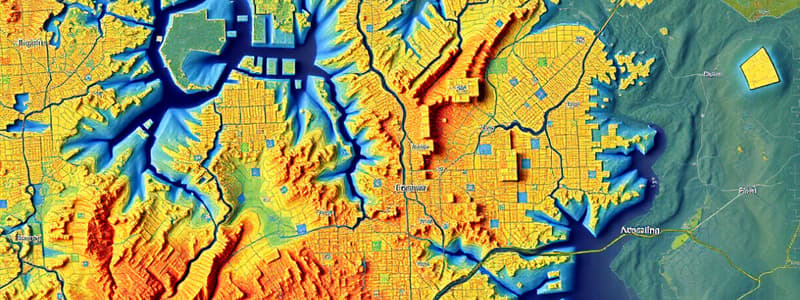Podcast
Questions and Answers
What is the primary focus of local functions in raster analysis?
What is the primary focus of local functions in raster analysis?
- Analysis of global patterns across layers
- Analysis of data on a cell-by-cell basis (correct)
- Analysis of multiple attribute types consolidated into fewer classes
- Analysis involving neighborhoods or windows surrounding cells
Which operation is NOT categorized under local functions in raster analysis?
Which operation is NOT categorized under local functions in raster analysis?
- Global Operations (correct)
- Proximity Analysis
- Reclassification
- Arithmetic Operations
What does binary masking in reclassification assign to represent presence or absence?
What does binary masking in reclassification assign to represent presence or absence?
- Values of 0 and 1 (correct)
- Integer values only
- Continuous scale from 0 to 1
- Values from 1 to 10
Which mathematical operation could convert elevation data from feet to meters?
Which mathematical operation could convert elevation data from feet to meters?
In logical statements, what is the result of a Boolean AND operation when one condition is false?
In logical statements, what is the result of a Boolean AND operation when one condition is false?
What type of analysis calculates the straight-line distance of each cell to the nearest source cell?
What type of analysis calculates the straight-line distance of each cell to the nearest source cell?
Which category consolidates multiple attribute types into fewer classes?
Which category consolidates multiple attribute types into fewer classes?
What is the distinction between local functions and more advanced raster analyses?
What is the distinction between local functions and more advanced raster analyses?
Flashcards
Raster Data Model
Raster Data Model
Represents continuous data using grid cells, contrasting with the object-based Vector Data Model.
Raster Analysis
Raster Analysis
Focuses on tools and operations to analyze raster data.
Local Functions
Local Functions
Raster analysis functions that operate on individual cells, performing calculations on a cell-by-cell basis.
Reclassification
Reclassification
Signup and view all the flashcards
Binary Masking
Binary Masking
Signup and view all the flashcards
Arithmetic Operations
Arithmetic Operations
Signup and view all the flashcards
Boolean Statements
Boolean Statements
Signup and view all the flashcards
Proximity Analysis
Proximity Analysis
Signup and view all the flashcards
Study Notes
Raster Operators for Analysis: Local Functions
- Raster data model represents continuous data using grid cells, contrasting to object-based vector data model
- Raster analysis focuses on local, focal, zonal, and global functions, this lecture focuses on local functions
- Local functions analyze data on a cell-by-cell basis
Categories of Local Functions
1. Reclassification
- Binary Masking: assigns values (0 or 1) for absence/presence or suitability, often an intermediate step
- Classification Reduction: consolidates multiple attribute types into fewer classes, e.g., merging forests
- Classification Ranking: assigns ranks/weights for further analysis, like least-cost path analysis
2. Arithmetic Operations
- Includes addition, subtraction, multiplication, and division applied to corresponding cells across layers
- Example: converting elevation data from feet to meters by multiplying by 0.305
3. Logical Statements
- Boolean AND: both conditions must be true for a value of 1; otherwise, the output is 0
- Boolean OR: if either condition is true, the value is 1
- Logical queries and map algebra can be performed using raster calculators
4. Proximity Analysis
- Euclidean Distance: calculates the straight-line distance of each cell to the nearest source cell; useful for analyses like buffering
Key Takeaways
- Raster and vector operations are different due to data models
- Local functions focus on individual cells or corresponding cells across layers
- Local level serves as a foundation for advanced raster analysis (focal, zonal, global)
Studying That Suits You
Use AI to generate personalized quizzes and flashcards to suit your learning preferences.
Related Documents
Description
This quiz explores local functions in raster analysis within the raster data model, focusing on methods like reclassification, arithmetic operations, and logical statements. Understand how these functions operate on a cell-by-cell basis to analyze continuous data effectively.





